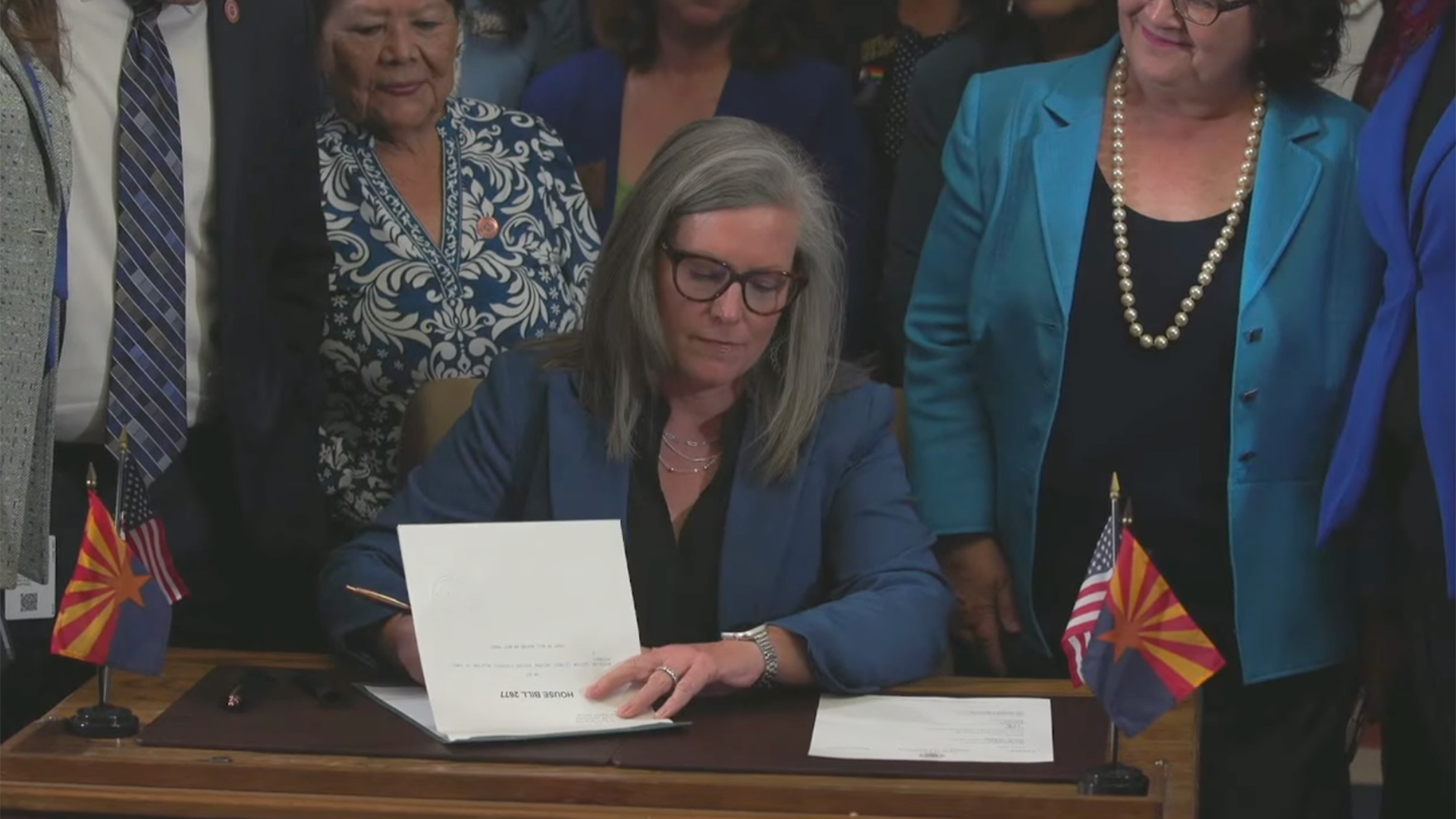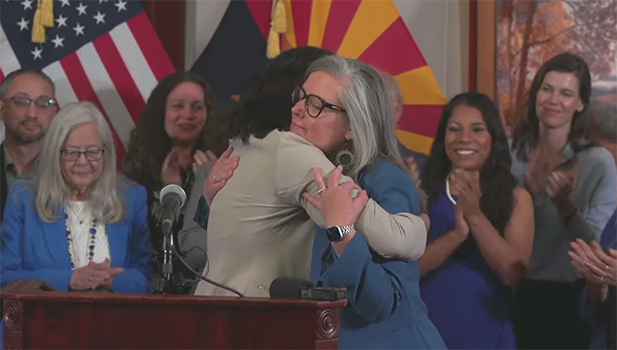 Governor Katie Hobbs signs the repeal of Arizona's near-total abortion ban from 1864 during a signing ceremony in Phoenix, AZ on May 2, 2024/
Governor Katie Hobbs signs the repeal of Arizona's near-total abortion ban from 1864 during a signing ceremony in Phoenix, AZ on May 2, 2024/
Governor Katie Hobbs signed a repeal of the state’s near-total abortion ban Thursday afternoon.
“Today, we are doing what 23 governors and 55 legislatures refused to do,” Hobbs said while signing the bill.
The repeal follows a contentious few weeks at the Capitol, where the majority of Republican lawmakers fought to keep it. However, Democrats say this is not the end.
“Today, we should not rest but we should recommit to protecting women's bodily autonomy, their ability to make their own health care decisions, and the ability to control their lives,” Hobbs said. “Let me be clear, I will do everything in my power to protect our reproductive freedoms, because I trust women to make the decisions that are best for them.”
Democratic lawmakers are pushing Arizonans to vote in favor of a proposed ballot measure that would enshrine abortion access into the state’s constitution this fall. That proposition would protect access until fetal viability–approximately 24 weeks.
“These bans are both draconian…and Arizonans are going to have a chance to have their say in that,” Hobbs said.
But, according to a leaked memo from GOP staff, Republicans are considering putting two other ballot measures that would conflict with the Arizonans for Abortion Access initiative. One proposed measure in the slides would scale back the state’s 15-week ban to 14 weeks.
“In reality, it’s a 14-week law disguised as a 15-week law because it would only allow abortion until the beginning of the 15th week,” the slide read.
Democratic Senator Anna Hernandez emphasized that without enshrined protections, Arizonans may still be at risk.
“Tomorrow, we could see the majority party bring forward a motion that would cut the 15-week ban down to nine weeks or even six weeks,” Henandez said. “Arizonans cannot trust this body to follow the will of the majority of Arizona voters.”
Tucson’s Democratic Representative Stephanie Stahl Hamilton also attended Thursday’s signing. Stahl Hamilton introduced the repeal earlier this month after the state’s high court ruled to enforce the 1864 near-total abortion ban. She said the signing of the repeal signified three moments in time.
“It's a time where we are doing away with what is in the past that doesn't fit the present and here we are in the present, looking forward to the future,” Stahl Hamilton said.
She also paid tribute to others who fought for reproductive freedoms in the state, like former democratic representative Athena Salman.
“None of us arrived at this moment without the foresight and the hard work of people like former representative Athena Salman who truly paved the way for today.”
 VIEW LARGER Governor Katie Hobbs hugs former Democratic Representative Athena Salman during the signing ceremony of the repeal of Arizona's near-total abortion ban in Phoenix on May 2, 2024.
VIEW LARGER Governor Katie Hobbs hugs former Democratic Representative Athena Salman during the signing ceremony of the repeal of Arizona's near-total abortion ban in Phoenix on May 2, 2024. Salman first introduced a repeal of the ban back in 2019. At the end of last year, she resigned from her role in the legislature to take up a position as director of Arizona campaigns for Reproductive Freedom For All. While attending the ceremony, Salman was visibly emotional.
“I can't stop thinking about my daughters and how they will have a future,” Salman said through tears.
While the repeal is now signed, it will not go into effect until 90 days after the legislature closes its regular session. That means pregnant Arizonans may still face restricted abortion access. Right now, the ban is set to take place on June 27.
However, House Assistant Minority Leader, Representative Oscar De Los Santos told AZPM News that Democrats will continue to go through the courts to delay the implementation.
“Our hope is that the courts will enjoin the 1864 law from taking effect because it would be silly for a court to let a law that has since been repealed take effect for a matter of weeks, only to then have it be repealed later,” De Los Santos said.
In either case, abortion providers like Dr. Gabrielle Goodrick say the repeal is a sigh of relief.
“It's the first step in Arizona giving people back their bodily autonomy,” Goodrick said. “This is the time, just like now is the time for the referendum. Arizona needs to protect its citizens and provide bodily autonomy for all its citizens.”



By submitting your comments, you hereby give AZPM the right to post your comments and potentially use them in any other form of media operated by this institution.